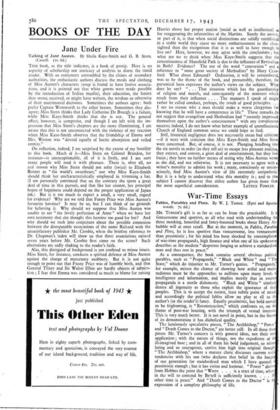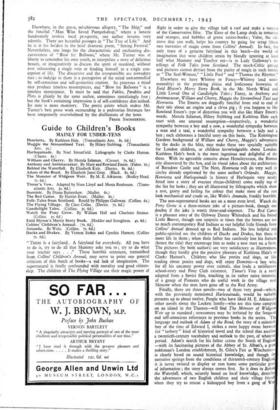War-Time Essays
Fables, Parables and Plots. By W. J. Turner. (Eyre and Spottis- woode. 7s. 6d.) MR. TURNER'S gift is as far as can be from the practicable. It ie ienturesome and sportive, as all who read with understanding the three mocking, beautiful and fancy-haunted books about Henry Air- bubble will at once recall. But at the moment, in Fables, Parables and Plots, he is less sportive than venturesome, less venturesome than pessimistic ; for his mind has been shocked by contemplati of war-time propaganda, high finance and what one of his spokesm describes as the modern "desperate longing to achieve a standardis man and thus rest in peace."
As a consequence, the book contains several obvious politic parables, such as " Propaganda " "Black and White" and " Th State," which do injustice to 1r. Turner's genius. "Propaganda, for example, misses the chance of showing how artful . and mul tudinous must be the approaches to millions upon many levels intelligence and information, and implies merely that in essenc propaganda is a sterile dishonesty. "Black and White" similar] denies all ingenuity to those who exploit the ignorance of th peoples. This is to accept the easiest, least subtle point of atta and accordingly the political fables allow no play at all to th author's (or the reader's) fancy. Equally pessimistic but bold enough to be frightening, is "Reconstruction," which confronts us, on the theme of post-war housing, with the triumph of vested interest This is very much better. It is not novel in point, but in the fines of its demonstration it has diabolical quality. The luminously speculative pieces, "The Archbishop," "Power and "Death Comes to the Doctor," are better still. In all these thr pieces Mr. Turner's concern is with general ideas, not their ml application • with the nature of things, not the expedients of ill-imagineci base ; and in all of them his bold judgement, so stim lating and so courageous, carries him high into original though "The Archbishop," where a mature cleric discusses current soc tendencies with his son (who declares that belief in the longi of our generation for standardised man which I have quoted) pessimistic enough ; but it has vision and humour. " Power " dens' from Hobbes the point that " Warre . . . is a tract of time, where in the will to contend. by Bartell is sufficiently known. . . . other time is peace." And "Death Comes to the Doctor" is expression of a complete philosophy of life. Elsewhere, in the gra Je, mischievous allegory, "The Ship," and the fanciful Man Who Saved Pumpelsdrop," where a lunatic handsomely revives local prosperity, our author invents very adroitly. There are beautiful passages in "The Tree of Life." And he is at his boklest in the brief dramatic poem, "Spring Festival." Nevertheless, one longs for the characteristic and enchanting dis- cursiveness of "Blow for Balloons," where Mr. Turner was at liberty to remember his own youth, to interpolate a story of delicious beauty, or imaginatively to discuss the spirit of mankind, without ever exhausting a single vein or binding himself to a single con- 4eption of life. The discursive and the irresponsible are nowadays rare ; to indulge in them is a prerogative of the mind untrammelled by self-conscious and self-protective caution. So generous a mind may produce timeless masterpieces, and "Blow for Balloons" is a timeless masterpiece. "It must be said that Fables, Parables and Plots is plainly by the same author, sometimes tantalisingly free ; but the book's remaining impression is of self-confidence dimnished. Its note is more monitory. The poetic gaiety which makes Mr. Turner's best prose work outstanding in a pedestrian literature has been temporarily overwhelmed by the disillusions of the hour.
FRANK SWINNERTON.



























 Previous page
Previous page